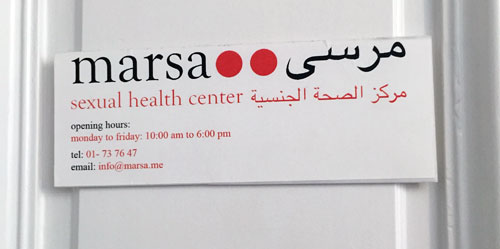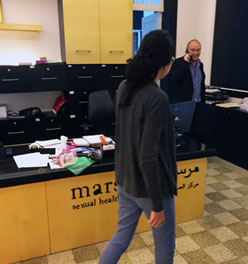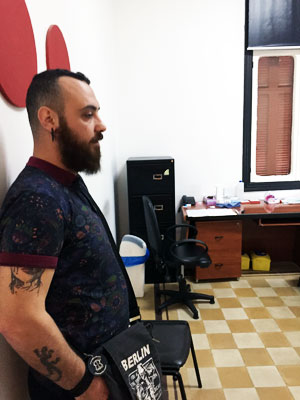Posted by Ben Clapham, May 18, 2015

The entrance to the clinic
Recently, I visited Johnny Tohme, a 2013 amfAR HIV Scholar, in Beirut, Lebanon, to find out how his GMT Initiative-supported research on HIV among GMT refugee populations from Syria, Iraq, and Palestine is going. While learning about Johnny’s interesting and groundbreaking project, I also had the opportunity to meet with Cynthia Al Khoury, who works for MARSA, a sexual health clinic serving many populations, but specifically targeting MSM and trans individuals. It is the only clinic in Lebanon doing this work, and it has so many clients that the healthcare workers could not meet with us until after hours.
 Cynthia Al Khoury crosses the clinic lobby. The clinic’s trans health program is in its second year and grew out of Cynthia’s thesis for her Master’s degree in Public Health. I found it exciting that Cynthia was able to take her thesis from paper to reality—and so did she. “I never expected my thesis to grow into anything substantial, much less a formal health program for such a stigmatized population,” she said.
Cynthia Al Khoury crosses the clinic lobby. The clinic’s trans health program is in its second year and grew out of Cynthia’s thesis for her Master’s degree in Public Health. I found it exciting that Cynthia was able to take her thesis from paper to reality—and so did she. “I never expected my thesis to grow into anything substantial, much less a formal health program for such a stigmatized population,” she said.
While being gay is criminalized in Lebanon, and there are strict social codes that forbid same-sex sexual behavior, it is considered to be one of the most LGBT-friendly Middle Eastern nations. There are LGBT bars and clubs—though they remain inconspicuous—and the younger generation seems more open to accepting LGBT people. In Lebanon, trans individuals are able to legally change their gender on their national identity documents, which is unusual in a country where homosexuality is illegal, and there are no laws against being transgender. However, societal stigma and discrimination against trans individuals is strong, causing barriers to education and employment. This leads many trans individuals in Lebanon to practice sex work to make a living, which puts them at high risk of HIV infection.
 Johnny Tohme waits in the clinic lobby. I asked Cynthia if there were any epidemiologic data about HIV among trans individuals, and she smiled, confirming what I already knew. There is no data available, and the government does not have any HIV programs targeting GMT individuals. But she reported that the HIV prevalence she has seen among the population seems to corroborate global data showing they have a higher prevalence than men who have sex with men (MSM) and a much higher rate than the general population. I asked her if she thought the Lebanese government would ever consider providing PrEP for trans individuals, and she said she hoped one day that conversation could be had, though it has not yet been a possibility. “I have tried to have that conversation, and it was shut down before the conversation was even begun,” she said sadly.
Johnny Tohme waits in the clinic lobby. I asked Cynthia if there were any epidemiologic data about HIV among trans individuals, and she smiled, confirming what I already knew. There is no data available, and the government does not have any HIV programs targeting GMT individuals. But she reported that the HIV prevalence she has seen among the population seems to corroborate global data showing they have a higher prevalence than men who have sex with men (MSM) and a much higher rate than the general population. I asked her if she thought the Lebanese government would ever consider providing PrEP for trans individuals, and she said she hoped one day that conversation could be had, though it has not yet been a possibility. “I have tried to have that conversation, and it was shut down before the conversation was even begun,” she said sadly.
MARSA currently has 19 trans clients actively enrolled in medical care, and Cynthia happily reported that they are welcoming more trans clients each month. The MARSA trans health program has trained community leaders in the trans community to educate and mobilize trans individuals and to let them know that MARSA offers free HIV preventive and treatment services and free mental healthcare. And while MARSA cannot afford to offer hormone treatment (prescription hormone therapy and sexual reassignment surgery are legal but scarce and prohibitively expensive), they do provide risk-reduction counseling for those who self-administer hormones that can be purchased on the street, which are potentially dangerous.
Overall, I was encouraged to see that MARSA had a functioning program for GMT individuals in the Middle East that is gaining the trust of its clients despite the tough legal and social situation that many face. The clinic is beautifully maintained, with staff who are friendly and welcoming, and it is definitely a place I would go for health services.